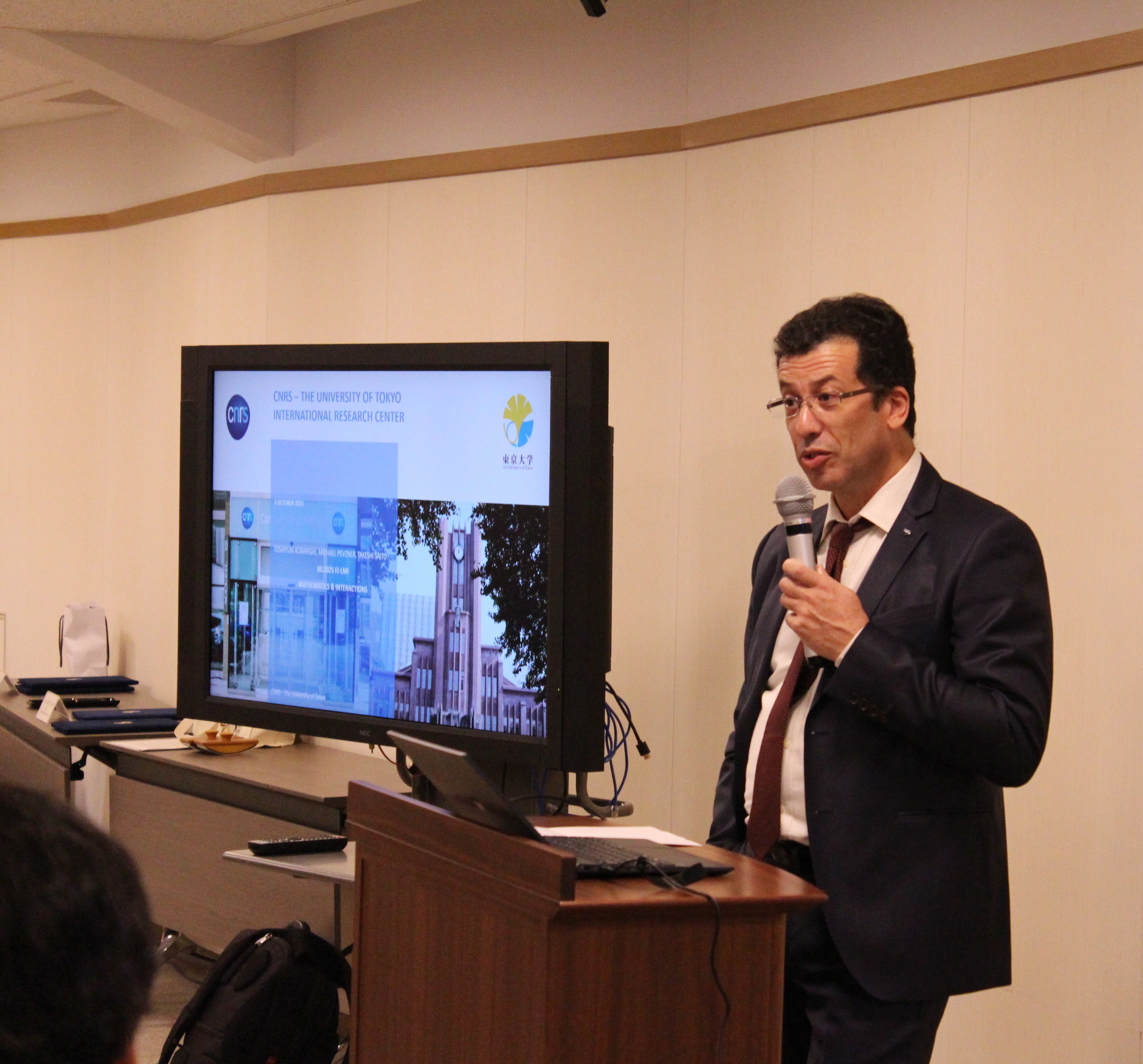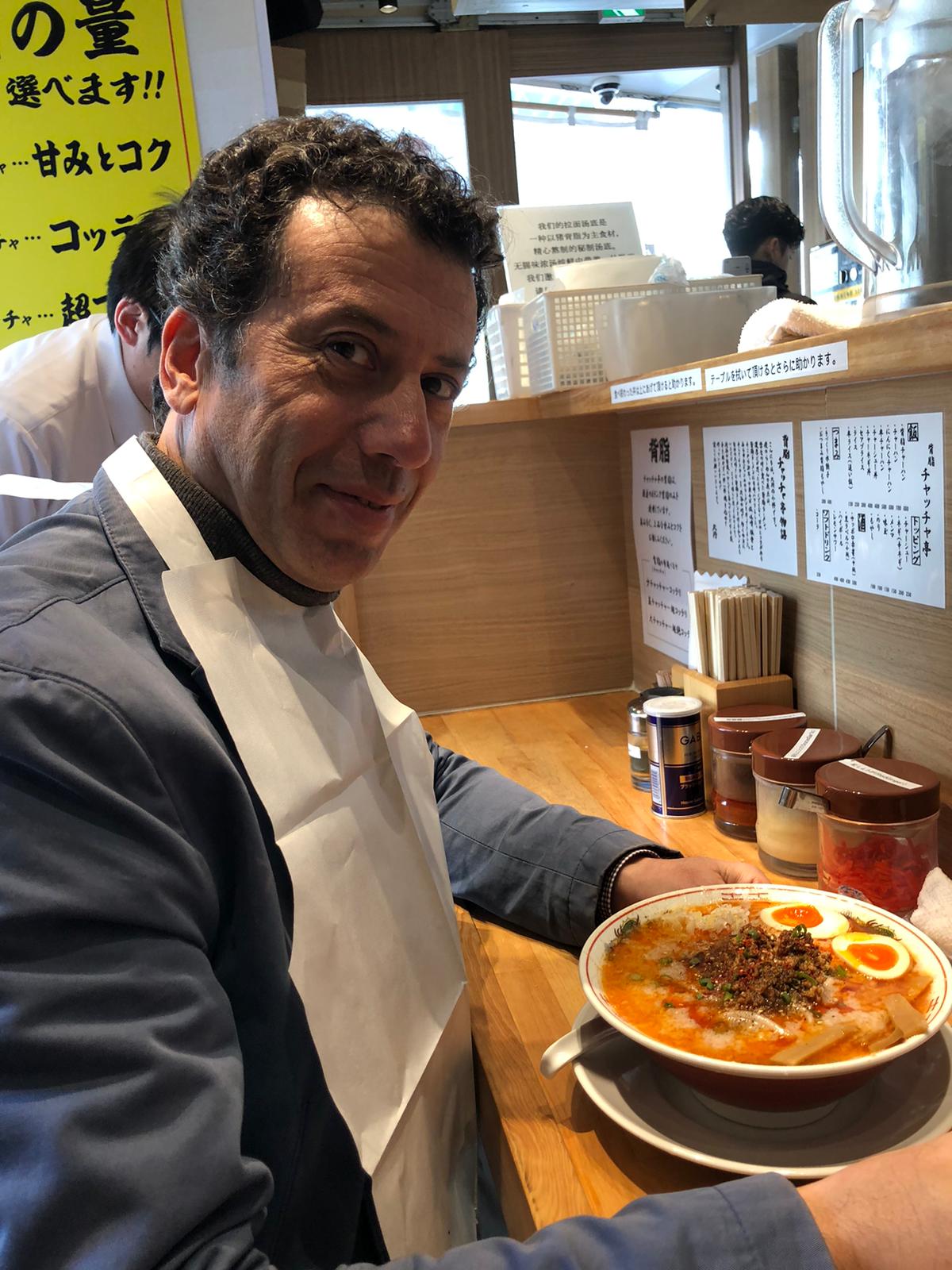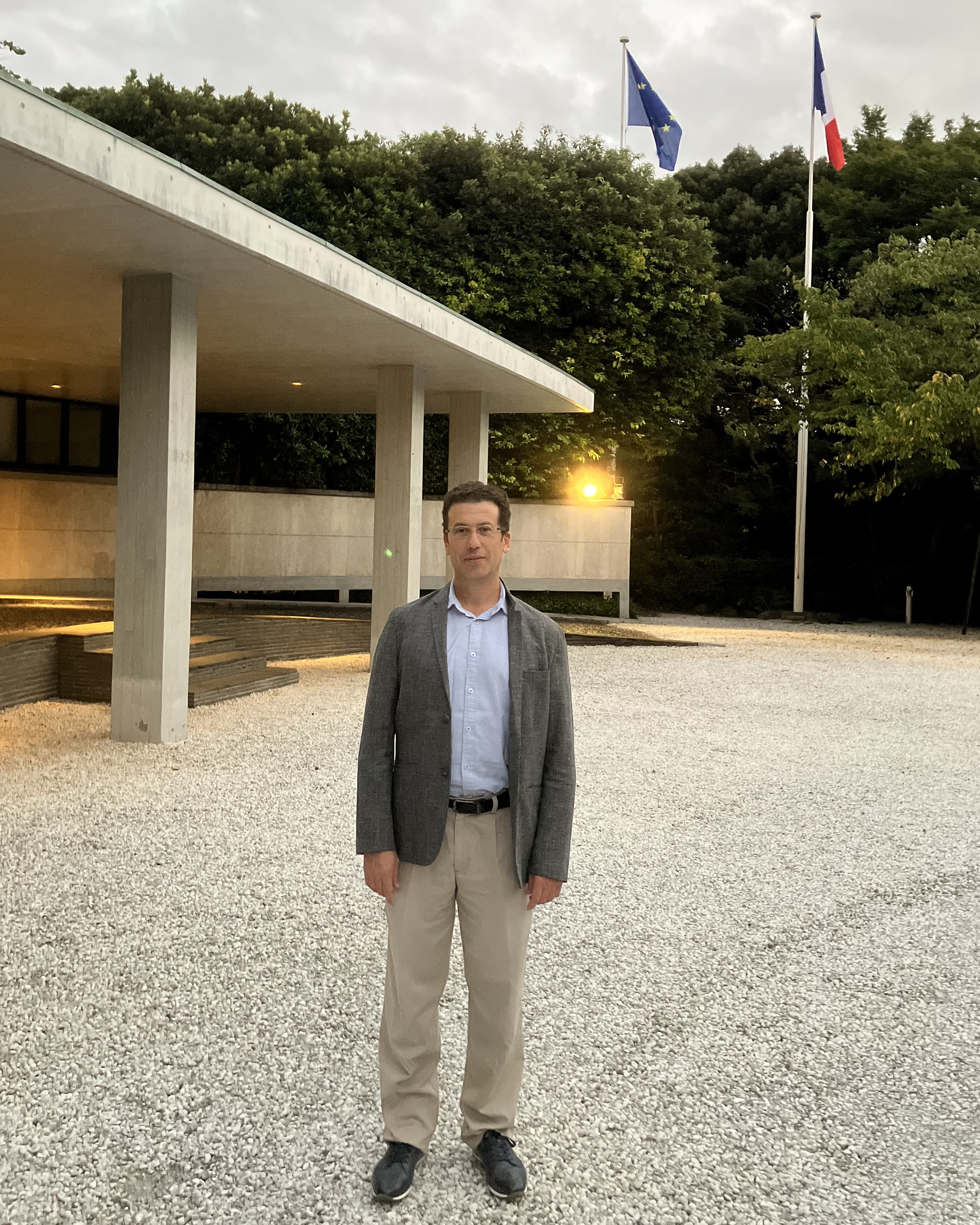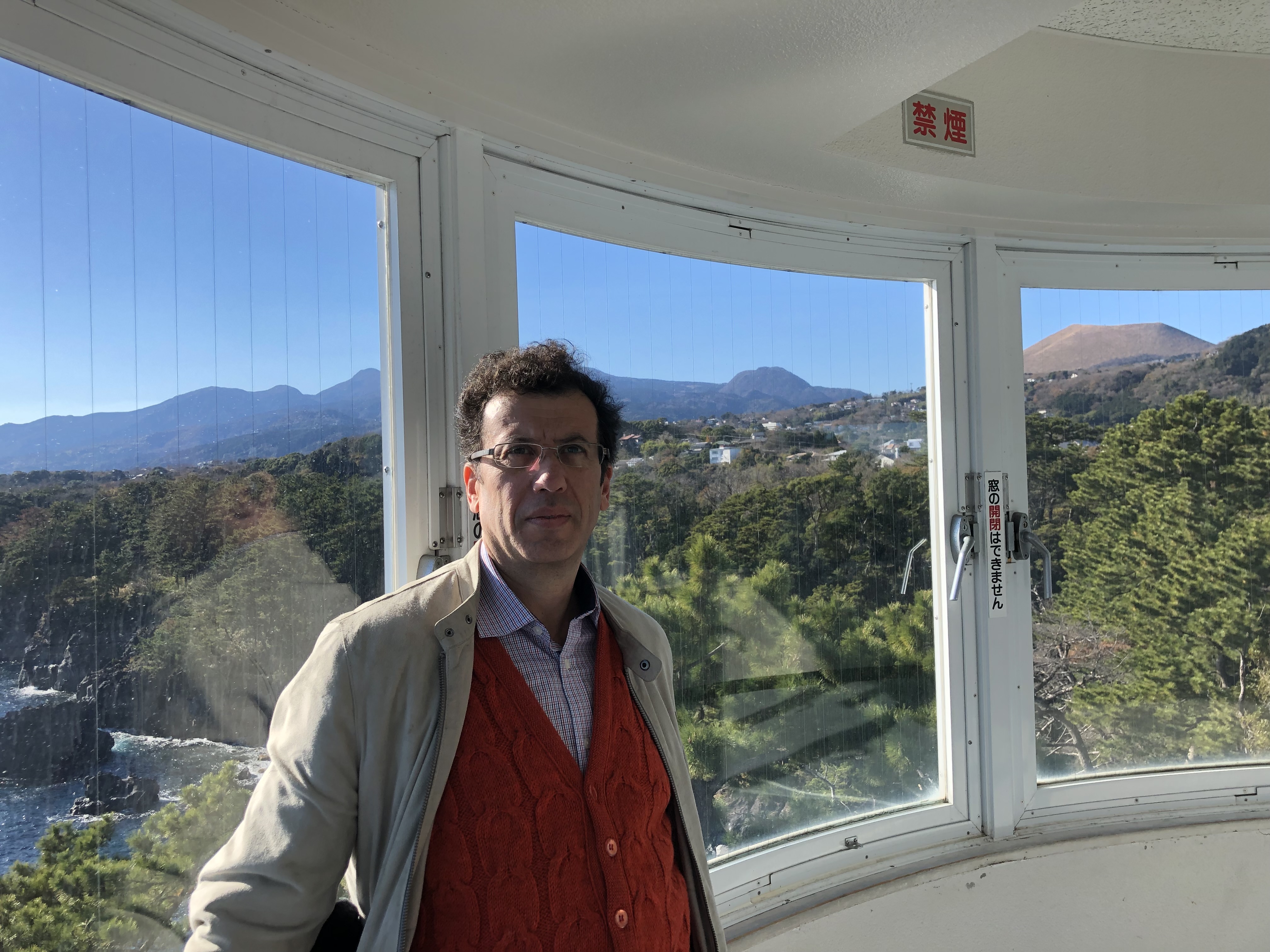Interview Series - Insights from Students -
- Name
- Michael PEVZNER
- Nationality
- France
- School at UTokyo
- Graduate School of Mathematical Sciences
- Academic Status
- Foreign Visiting Researcher
- Date of enrollment UTokyo
- September,2023
- The language used for the interview
- English

Encountering Japan over 25 years ago
You’ve been at UTokyo since last year, right? Could you tell me about how you came to Japan?
I have a collaborator in Tokyo, and we are working on several projects together. We have known each other for more than 25 years now. During that time, my collaborator has visited me in France many times, and I have also visited Tokyo several times.
Last year, a new joint research project between the French CNRS (National Centre for Scientific Research) and the Graduate School of Mathematical Sciences of UTokyo started, and I have been staying at UTokyo for the past year.
So, most of your colleagues are Japanese?
Yes, but we have many French guests visiting the laboratory. For instance, this week, a French professor is organizing a conference at Komaba. That happens quite often.

Attracted to the mysteries of Japan
Why did you decide to come to Japan this time?
There are several reasons. First, as I mentioned earlier, I have been collaborating with someone in Japan for over 20 years, and last year a new project started. That’s the official reason.
So, does that mean there’s an “unofficial” reason?
Yes, the unofficial reason is that I’ve been fascinated by Japan for many years. I’ve been attracted to the idea of staying here longer, to discover more about Japanese civilization, which I find both attractive and mysterious.

Oh, mysterious? What do you mean by that? Could you explain in detail what you find mysterious and what impressed you?
About the mystery? Well, now I’m much more familiar with things, and traveling and communicating have become easier. But 30 years ago, when I first encountered Japan, everything was completely different. Japan was fascinating because it was so different—the way of thinking, the language—everything was completely unfamiliar to me.
Did you realize that while communicating with your research collaborators?
Oh, no. In our project, mathematics is universal, so communication isn’t really a problem. Moreover, my colleagues are very open-minded and have spent a lot of time abroad, in the US and Europe, so they understand both cultures. They helped me a lot to understand the Japanese way of thinking and communication. However, over time, I’ve progressively discovered many cultural codes—like how to address people and the way respect is shown in communication. That’s where the differences are important. In Japan, you anticipate many things, whereas in European cultures, people tend to be less careful about these subtle aspects.
I see. Did you notice that more after moving to Japan?
Yes, definitely.
Differences lead to both “challenges” and “fascination,” like solving a puzzle
So, let’s talk about the Japanese language. From what you mentioned earlier, does that mean Japanese isn’t necessary in your daily research life?
Well, in principle, that’s true, but we do have some weekly student seminars and research seminars, and usually the speakers give their talks in Japanese. So, it’s helpful to at least catch the structure of the sentences and be able to ask some very basic questions. Of course, they automatically switch to English very quickly because they anticipate my difficulties and don’t want to put extra pressure on me.
So, what plans do you have for learning Japanese?
Practically, it’s important to understand at least an elementary level of Japanese. However, from my personal point of view, it’s a very attractive language, especially from a linguistic comparative perspective. For instance, I’ve always wondered how a nonphonetic writing system influences the way one thinks and conceptualizes language. Having grown so accustomed to languages that transcribe sounds rather than concepts, I find Japanese quite fascinating in its cognitive approach to language. Studying a completely different language is quite challenging. The grammar is very different, and the writing system is complicated and mysterious.
This adds an extra layer of motivation for me; it feels like solving a puzzle, which I really enjoy.
I see. That makes sense. Watching you in Japanese class, we also thought you seemed to enjoy solving puzzles. As expected from a mathematician, you’re thinking in a mathematical way even when learning Japanese.
Of course, while learning Japanese, I try to connect a network of points, linking them together. I believe that learning Japanese is also a logical process.
A hole opens in the thick wall ahead!
Is your motivation to improve your Japanese a matter of necessity or curiosity?
It’s definitely both. Of course, it’s necessary in daily life, at least to show respect to the people I meet in the correct way. But it’s also a kind of hobby for me to discover foreign languages.
What do you mean by “respect to the people” that you mentioned?
I always meet many colleagues and visit different places, like seminars, and people are very happy when I use at least a few words in Japanese. Even if I can communicate in English, using just a few sentences or expressions in Japanese can show respect to them.

Has that motivation changed over time?
Yes. Before, the Japanese language felt like a kind of “wall” to me. But now, I feel like I can squeeze through a “hole.” It’s like discovering a new country, and there are more and more interesting things that attract me and keep me motivated.
Real human interaction cannot be replaced by machines
Lastly, could you share your thoughts on learning a language in a classroom setting? Nowadays, there are many options like AI and apps. Given how busy people are every day, what do you think about the idea of coming to a classroom to study Japanese?
First of all, I believe that using AI and machine translation alongside studying on your own are complementary. Of course, I use ChatGPT to help write emails, and it often gives me surprisingly insightful suggestions. However, I don’t think machine-based tools can fully replace real human interaction.
How do you think about classroom lessons?
Regarding online lessons, my opinion has actually changed after experiencing them myself. When the COVID-19 pandemic started, I had conversations with my fellow mathematicians, and we talked about how it’s harder to communicate effectively through Zoom compared to in-person interactions, especially in fields like mathematics, where a large blackboard is essential.
However, after joining a Japanese class on Zoom last year, I found that communication was smooth, and the “human-to-human” element was still present. I think online classes are quite appropriate. Group exercises were also conducted smoothly.
Moreover, the class had participants from different departments, countries, and regions, including younger students from France. It was a good example of human interaction, and it was interesting to engage with people from diverse fields and ages. Now, I find it perfectly fine.
I see. Thank you for sharing your story. It was very insightful. Do you plan to continue studying Japanese in the future?
Yes. Right now, I depend on Google Translate, but I want to become an independent user who doesn’t rely on such tools.
